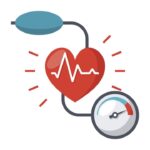Magnetic Resonance Imaging (MRI) is a modern, advanced diagnostic imaging technique that provides much higher image quality than ultrasound, X-rays, or CT scans, aiding in accurate disease diagnosis in specific cases.
1. What is MRI?
MRI, or Magnetic Resonance Imaging, is a technique that generates cross-sectional images using magnetic and radio waves. It relies on the principle of absorption and release of RF energy by hydrogen atoms in the body under the influence of magnetic and radio waves. This released energy is then detected, processed, and converted into images.
MRI images have high contrast, sharpness, clear details, and excellent anatomical depiction, along with the ability to produce 3D reconstructions, providing extremely accurate diagnostic value to physicians. In most cases, the diagnostic efficacy of MRI is significantly higher compared to other imaging modalities such as ultrasound, X-rays, or CT scans.

Magnetic resonance imaging (MRI) is a painless test that produces very clear images of the organs and structures inside your body
2. When is MRI indicated and for which body parts?
2.1. Which body parts are MRI indicated for?
MRI, being radiation-free and patient-friendly, is highly valued by medical professionals both in disease diagnosis and safety. MRI is typically indicated for the following body parts:
- Brain MRI
- Cardiovascular and vascular MRI
- Orbital MRI
- Neck MRI
- Spine MRI
- Abdominal and pelvic MRI
- Joint MRI
- Breast MRI
In particular, MRI is one of the most valuable methods for diagnosing fetal abnormalities, detecting complex congenital defects early. Physicians recommend MRI for cases where ultrasound examination is challenging, such as in obese pregnancies, oligoamnios, or evaluating fetal movements.
2.2. When is MRI indicated?
Usually, during initial consultations, if there are suspicions of the following conditions, physicians advise and order MRI scans:
– Suspected brain tumors, cranial nerve tumors, strokes, trauma, seizures, leukoencephalopathy, encephalitis, meningitis, vascular-related diseases, etc.
– Complex eye, ear, nose, and throat conditions like tumors, trauma, and inflammations.
– Spinal conditions like trauma, inflammation, disc herniation, spinal cord tumors.
– Joint-related diseases including knees, shoulders, hips, wrists, and ankles.
– Suspected soft tissue masses, early cancer detection.
– Evaluation of organ conditions such as liver, spleen, lungs.
– Breast diseases, gynecological abnormalities.
– MRI is also useful in suspected cardiac issues, cerebral perfusion, diffusion MRI, etc.

If there are suspicions of the following conditions, physicians advise and order MRI scans
3. Advantages of MRI
As mentioned earlier, MRI images hold significantly higher value than ultrasound, X-rays, or CT scans. This is evident through the following advantages:
– MRI provides clearer and more detailed images of soft tissue structures in the body, such as the heart, brain, liver, kidneys, and other organs, compared to other diagnostic methods.
– MRI aids in assessing both the functional activity and structure of many internal organs.
– The detailed images provided by MRI serve as a powerful tool in early disease diagnosis and evaluation of body tumors.
– MRI imaging does not pose the risks of adverse effects associated with X-ray radiation exposure or CT scans.
– MRI can detect subtle abnormalities hidden beneath bone layers that other imaging modalities may struggle to identify.
– MRI offers more valuable information for cardiovascular disease diagnosis than X-rays.
– MRI does not emit harmful radiation detrimental to human health.

High-value MRI images aid physicians in accurately diagnosing encountered pathologies.
4. Duration of MRI scans
The MRI scanning process is relatively quick, taking approximately 12-20 minutes (depending on the number of organs or body parts scanned and the patient’s cooperation). In cases where abnormalities are detected, the scanning time may be prolonged. The quickest turnaround time for results is about 15 minutes (common in emergency cases), while more complex cases may require consultation, extending result delivery time to several hours.
Patients undergo initial examinations with physicians to assess their health status. When complex medical conditions or inconclusive results from other imaging modalities are suspected, physicians order MRI scans. Patients then undergo MRI scans, following the instructions provided by MRI technicians.
5. Advantages of MRI at TCI – Thu Cuc Healthcare System
TCI – Thu Cuc Healthcare System gathers proficient physicians across all specialties, adept in utilizing MRI for diagnosis and effective disease management. The professional team of MRI technicians ensures swift and meticulous procedures, guiding patients through the scanning process to ensure proper execution and timely completion.
Moreover, all facilities at TCI – Thu Cuc Healthcare System are equipped with modern MRI machines, operating on advanced H2 principles, minimizing operational noise. Consequently, the MRI scanning process proceeds smoothly, ensuring high efficiency, sharp image quality, and patient comfort throughout.
Patients encountering health abnormalities are encouraged to proactively seek medical consultations. When necessary, physicians will recommend MRI scans to accurately diagnose encountered medical conditions and devise appropriate treatment protocols.








